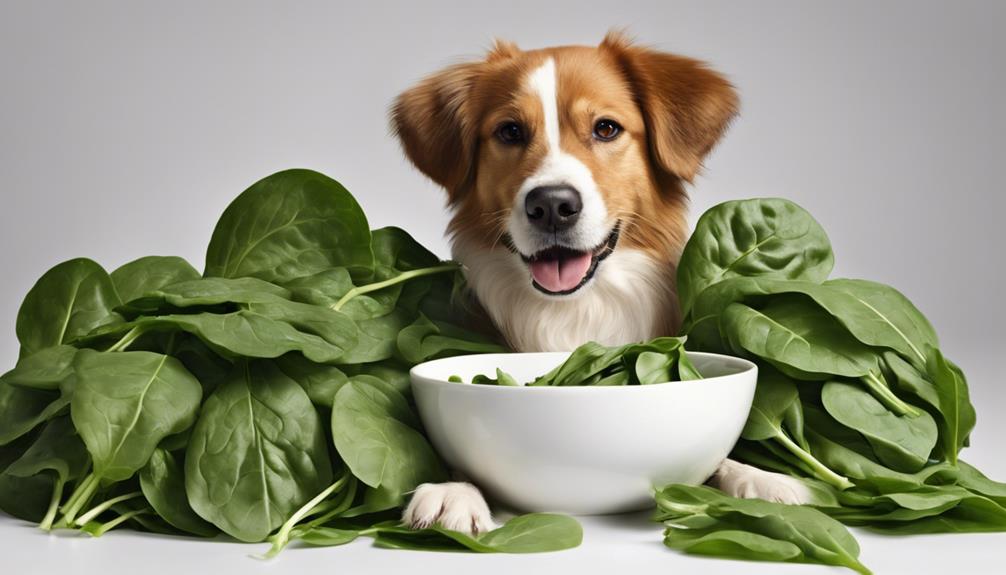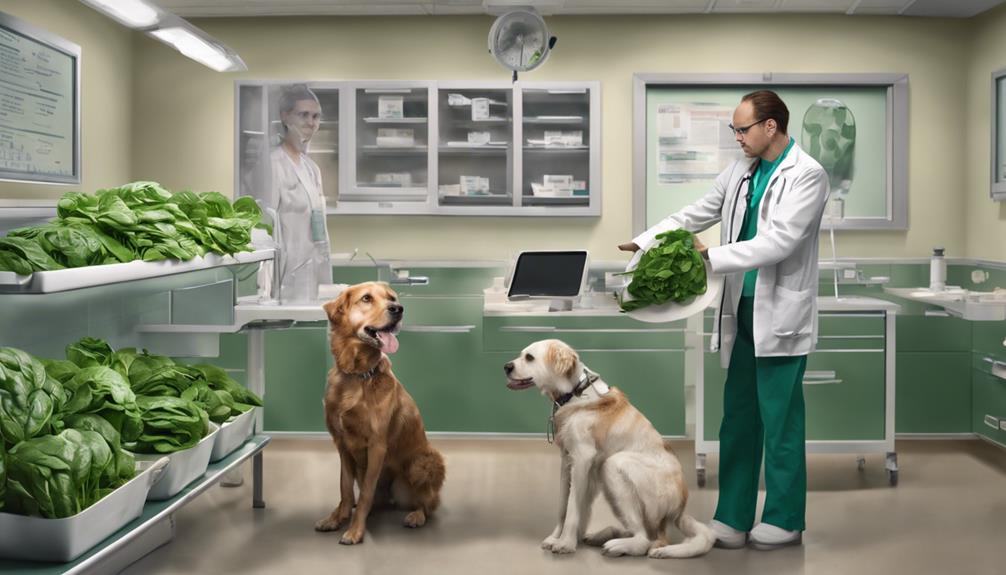Yes, dogs can safely eat spinach. It’s packed with vitamins and fiber that support their health. But remember, too much can have risks. Spinach has oxalic acid that can affect calcium absorption and lead to kidney issues. Importance is essential. When serving, wash and chop the leaves, and consider cooking methods like steaming or boiling. Start with small amounts, 1-3 tablespoons one to two times a week is good. Also, consult your vet for advice tailored to your dog’s needs. For more information about spinach and safe feeding practices for dogs, consider exploring the potential benefits and risks further.
Key Takeaways
- Spinach is safe for dogs in moderation.
- Organic spinach is preferred.
- Cooked spinach is safer than raw.
- Limit servings to prevent health risks.
- Consider alternatives for a balanced diet.
Potential Health Benefits of Spinach for Dogs
When feeding dogs spinach, we can expect several important health benefits due to its rich nutrient profile. Spinach is packed with vitamins A, B, C, and K, which are vital for supporting dogs' overall health and boosting their immunity.
Additionally, the iron, antioxidants, and beta-carotene found in spinach can improve dogs' vision, bone health, and immune system. The high fiber content in spinach is also beneficial for dogs' digestion, promoting gut health when consumed in moderation.
Including small amounts of spinach in your dog's diet can contribute to maintaining good heart health and supporting their digestion. Whether served raw or cooked, spinach can be a nutritious addition to your furry friend's meals.
However, it's important to remember that while spinach offers various health benefits, excessive consumption should be avoided to prevent any potential health risks such as kidney damage, as large quantities of spinach can be toxic to dogs.
Risks of Feeding Spinach to Dogs

While spinach can offer health benefits to dogs, it is important to be aware of the potential risks associated with feeding it to them. Spinach contains oxalic acid, which can hinder calcium absorption and potentially lead to kidney damage in dogs. High oxalate levels in spinach can contribute to the formation of kidney stones and kidney failure in dogs. Signs of oxalate overload in dogs may include muscle weakness, abnormal heart rhythm, and the development of kidney stones. Organic spinach is recommended to minimize exposure to pesticides when feeding it to dogs. Due to its high sodium content, spinach should be given to dogs in moderation to prevent potential health concerns.
| Risks of Feeding Spinach to Dogs |
|---|
| Oxalic acid hindering calcium absorption |
| Kidney damage and kidney stones |
| High sodium content |
| Importance of moderation |
Safe Cooking Methods for Spinach

To ensure the safety of dogs when preparing spinach, it's essential to thoroughly wash the leaves to eliminate any pesticides or dirt before cooking. Chop the spinach into small, manageable pieces, making it easier for your furry friend to eat.
When cooking spinach for your dog, opt for steaming or boiling methods without adding harmful ingredients like salt, oil, or garlic. Boiled spinach is a good option for dogs as it breaks down the oxalic acid, making it safer for consumption.
Remember, cooked spinach is preferable over raw or canned spinach for dogs, ensuring the preservation of nutrients and the absence of harmful additives. By feeding dogs small amounts of soluble and properly cooked spinach, you can promote healthy kidneys and overall well-being.
Keep in mind these guidelines when preparing spinach for your canine companion to enjoy a safe and nutritious treat.
Recommended Serving Sizes for Dogs

Considering the dietary needs of dogs, it's crucial to serve cooked spinach in moderation to ensure their well-being and prevent potential health issues. When deciding on the appropriate serving sizes for dogs, it's important to keep in mind the following recommendations:
- Dogs can safely eat 1-3 tablespoons of cooked spinach once or twice a week.
- Spinach should constitute less than 10% of a dog's daily caloric intake to avoid overconsumption.
- Puppies should wait until they're adults before being introduced to spinach due to its high oxalate levels.
Spinach Alternatives for Dogs

When exploring vegetable options for dogs beyond spinach, safe and nutritious alternatives such as carrots, green beans, and sweet potatoes can be valuable additions to their diet.
Carrots are a fantastic choice, providing a low-calorie snack packed with essential vitamins that can benefit your furry friend's health.
Green beans offer fiber and essential vitamins without loading up on excess calories, making them a great option for dogs looking to maintain a healthy weight.
Sweet potatoes are another excellent choice, as they're rich in vitamins and can aid in digestion for dogs, promoting overall well-being.
These spinach alternatives not only provide variety in your dog's diet but also offer a range of health benefits that can support their overall health. So, consider incorporating these nutritious vegetables into your dog's meals to make sure they get the essential nutrients they need to thrive.
Consult Your Vet Before Feeding Spinach

Before incorporating spinach into your dog's diet, consulting your vet is vital to guarantee their safety and well-being. Your vet can provide personalized advice on the appropriate amount of spinach to feed your dog, considering factors such as size, age, and overall health. Additionally, they can guide you on how to process small amounts of spinach and how frequently it can be included in your dog's meals without causing any negative effects.
- Make sure to process small amounts: Vets can advise on how to prepare and serve spinach to maximize its nutritional benefits while minimizing any risks.
- Avoid upsetting your dog's stomach: Feeding your dog spinach in excessive amounts can upset their stomach, so it's essential to follow your vet's recommendations carefully.
- Prevent calcium imbalances: Excessive spinach consumption can lead to calcium imbalances, which can have negative effects on your dog's health. Consulting your vet ensures that your dog's diet remains balanced and safe.
Frequently Asked Questions
How Much Spinach Can I Give My Dog?
We can give our dogs 1-3 tablespoons of cooked spinach once or twice a week. Remember that spinach should only be a small part of their diet due to its high oxalate and sodium content. By restricting their spinach intake, we can help prevent kidney issues.
Giving dogs too much spinach can cause stomach problems. Consult a vet to determine the appropriate amount of spinach for your furry friend.
Can Dogs Eat Spinach Raw or Cooked?
We can feed dogs spinach, whether raw or cooked. However, cooking spinach makes it easier for dogs to digest. Raw spinach might be tougher for them to chew and process, possibly causing stomach issues.
It's best to boil or steam spinach for dogs, ensuring they benefit from its nutrients. Avoid adding seasonings, spices, butter, or oils to prevent health problems.
What Are the Side Effects of Spinach for Dogs?
Yes, the side effects of spinach for dogs can be harmful. Oxalic acid in spinach can lead to kidney damage, stones, and gastrointestinal upset. Signs of oxalate overload include muscle weakness, abnormal heart rhythm, and potential kidney stones.
Moderation is key to avoid health issues in dogs. Be cautious with spinach and monitor your pet's intake for their well-being.
What Are the Healthiest Vegetables for Dogs?
When searching for the healthiest vegetables for dogs, it's important to explore options like carrots, green beans, and sweet potatoes.
These veggies provide essential nutrients, fiber, and vitamins without excess calories, promoting overall well-being.
Incorporating these vegetables into a dog's diet can support their health and digestion.
Is it Safe for Dogs to Eat Fruits and Vegetables?
Yes, dogs can eat oranges as they are a good source of vitamins and fiber. However, they should be given in moderation due to their high sugar content. Other safe fruits and vegetables for dogs include apples, carrots, and green beans. Always consult with your vet before introducing new foods to your dog’s diet.
Conclusion
To wrap up, while spinach can provide some health benefits for dogs, it's important to be cautious about how much you feed them.
Always consult your vet before incorporating spinach into your dog's diet to make certain it's safe and appropriate for them.
Remember to use safe cooking methods and stick to recommended serving sizes.
If in doubt, there are plenty of other dog-friendly vegetables you can offer as alternatives.
Your furry friend's health and well-being should always be the top priority.










